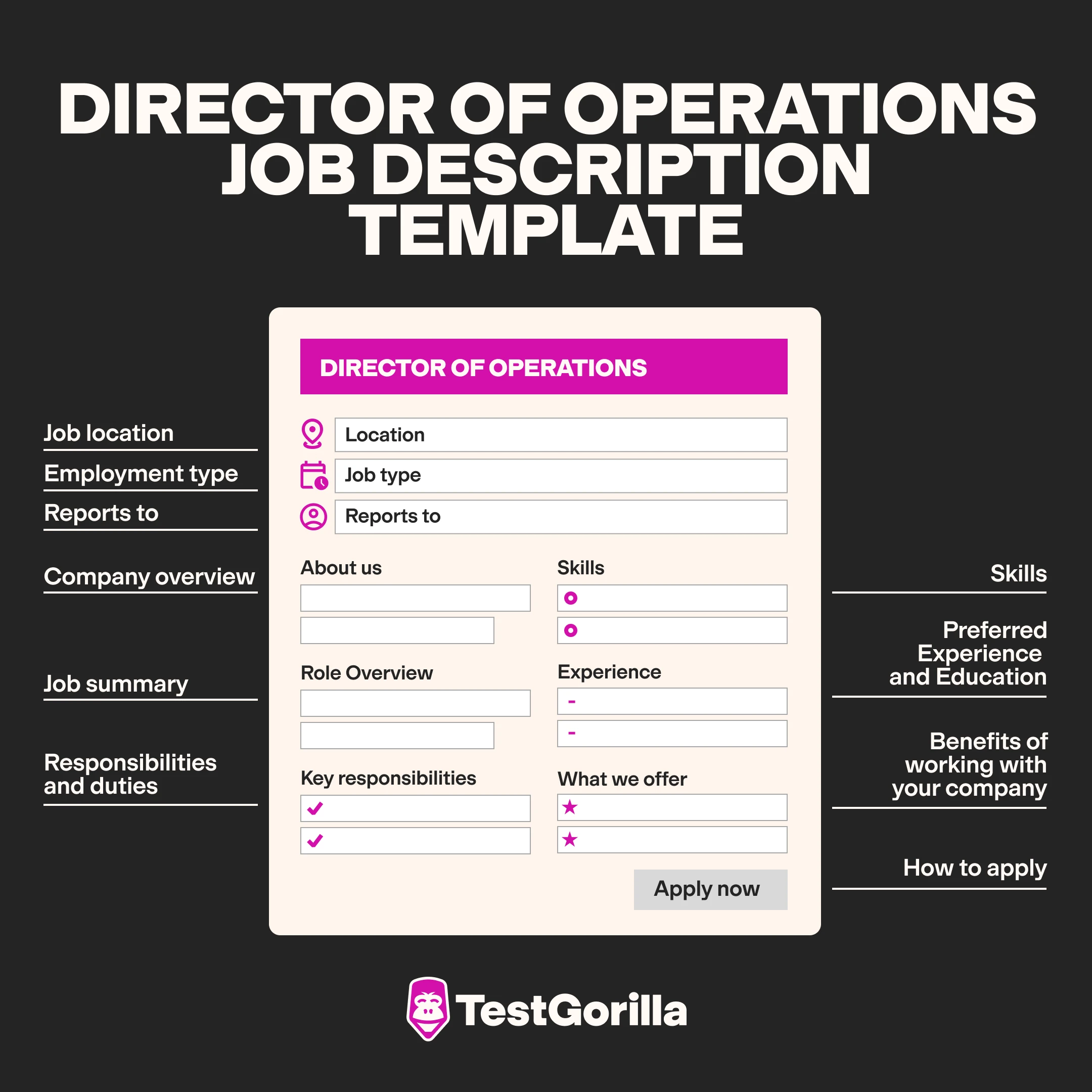Director of operations job description template: Everything you need to include
Directors of operations are key to keeping your company running smoothly. They optimize your company's daily processes, saving you time, staying on budget, and ensuring everything works like clockwork.
Unfortunately, many companies mis-hire for this role because their job description focuses too much on technical skills and overlooks essential soft skills, such as strong leadership. When this happens, the entire business can suffer from operational inefficiencies, lost revenue, and team frustration.
Don’t worry – we’ll help you avoid these challenges.
In this article, we provide a well-balanced director of operations job description template designed to attract the best candidates. Further, we explain how a skills-based hiring process can help you select top talent for this critical role.
Director of operations job description template
Job Title: Director of Operations
Location: [Insert Location]
Reports To: Chief Executive Officer (CEO) or Chief Operating Officer (COO)
Job Type: [Full-time/Part-time/Contract]
About Us
[Company Name] is a dynamic organization specializing in [brief description of the company’s focus, e.g., cutting-edge technology solutions, sustainable consumer products, etc.]. Our mission is to [state the mission, e.g., “deliver exceptional products and services that drive sustainable growth”].
We value [core values such as integrity, innovation, and operational excellence], and our culture is one of collaboration and continuous improvement. Recognized for [unique qualities, e.g., award-winning products, customer satisfaction], we strive to lead in the [industry or sector].
Job Overview
We are seeking an experienced and strategic Director of Operations to oversee and optimize our company’s daily operations. This role will be instrumental in aligning business processes, managing cross-functional teams, and driving operational efficiency.
The ideal candidate has a strong background in operations, excellent leadership skills, and a results-oriented mindset to ensure that company objectives are met.
Key Responsibilities
Oversee daily operations across departments, ensuring that processes are streamlined, efficient, and aligned with company objectives.
Develop and implement operational policies and procedures to improve productivity, efficiency, and scalability.
Manage the operations budget, optimizing costs while maintaining high standards of quality and service.
Collaborate with senior leadership to set strategic goals and translate them into actionable operational plans.
Establish key performance indicators (KPIs) and metrics to monitor and evaluate operational success, making data-driven adjustments as necessary.
Lead cross-functional teams to execute company initiatives, driving operational improvements and resolving bottlenecks.
Oversee supply chain and vendor management, negotiating contracts and ensuring quality standards are maintained.
Manage and mentor operations team members, fostering a collaborative and performance-driven environment.
Ensure compliance with all industry regulations, safety standards, and company policies.
Identify and implement technology solutions to improve workflow and productivity.
Conduct regular reviews of operational processes, identifying areas for improvement and implementing best practices.
Act as a liaison between operations and other departments, such as finance, HR, and sales, to ensure alignment and support for business initiatives.
Prepare and present operational performance reports and strategic recommendations to the executive team.
Skills
Strong leadership and people management skills, with the ability to motivate and develop teams.
Exceptional organizational and time-management abilities to handle multiple responsibilities effectively.
Proven ability to develop and implement effective operational policies and strategies.
Analytical skills with a data-driven approach to decision-making and process improvement.
Excellent communication and interpersonal skills for collaboration across all levels of the organization.
Proficiency in operations management software (e.g., ERP systems, project management tools).
Strong financial acumen, with the ability to manage budgets and understand P&L statements.
Problem-solving skills to identify, analyze, and resolve complex operational issues.
Experience in supply chain, vendor management, and contract negotiation.
Adaptability and resilience to work in a dynamic, fast-paced environment.
Preferred Experience and Education
Proven experience in operations management, with a minimum of [X years] in a leadership role.
Bachelor’s degree in Business Administration, Operations Management, or a related field; a Master’s degree is a plus.
Demonstrated success in managing operational functions across departments and driving company performance.
Industry-specific experience (e.g., manufacturing, technology, consumer goods) is advantageous.
Certification in operations management or project management (e.g., Six Sigma, PMP) is a plus.
Benefits
[List the benefits of joining your company, such as health coverage, paid time off, professional development opportunities, a collaborative work environment, flexible working hours, etc.]
Application Instructions
If you are a strategic thinker with a passion for operational excellence, we invite you to apply. Please send your application materials [including a cover letter, resume, and any relevant certifications] to [email address] by [application deadline].
Why this director of operations job description template works
This job description was crafted to attract the best ops leaders for your director of operations role. Below, we’ll discuss how we've designed it to cover all the essentials while leaving scope for adjustment.
Company and job overview
The job description kicks off with a company overview. Since operations can be a so-called "dry" role, this section helps candidates decide if they're passionate and confident about your company's products and services before they apply.
We also shed light on the nature of the role – full vs. part-time and the office location. At a time when remote work is increasingly common, it's critical to share your preferred work arrangements and prevent ill-fitting candidates from applying.
Additionally, we briefly outline what a successful candidate looks like and who they'll work closely with. By emphasizing the seniority and seriousness of this position upfront, you can prevent junior or unqualified applicants early on – saving you the hassle of weeding them out later.
Key responsibilities
While the specificity of tasks is usually critical to job descriptions, we've deliberately provided only high-level responsibilities for the role, so candidates – typically senior folks – understand their goals but also have the freedom to lead their operations team in their own way.
For instance, candidates are tasked with identifying and implementing tech solutions to improve operations, but we don't limit them to specific tools.
In addition to role-specific duties, like overseeing daily operations, implementing policies, and managing budgets, we've outlined leadership responsibilities, such as mentorship and cross-functional collaboration, so that candidates are well-informed about the breadth of work expected in advance.
Candidate requirements
Moreover, unlike standard role descriptions, this one emphasizes essential director of operations skills and only lists educational qualifications as "preferred."
Good operations don't necessarily stem from a specific college degree. These skills can be gained and honed through practical work experience and alternative ways of learning. This skills-based approach lets you cast a wider net for talented individuals who could fit the bill.
Company benefits and application process
Finally, the job description closes by describing your company's key employee benefits, helping you stand out among competing firms. Additionally, it clearly states how interested candidates can apply for the role – ensuring you don't lose top talent to poor comms.
The best insights on HR and recruitment, delivered to your inbox.
Biweekly updates. No spam. Unsubscribe any time.
Next steps: Attracting and assessing director of operations candidates
A thoughtfully crafted job description can help you attract high-caliber operations professionals, but you must assess them thoroughly for this high-stakes role. TestGorilla's talent assessments are an effective way to do this.
Our library of 350+ pre-employment tests helps to screen applicants quickly and accurately on all requirements for the role – from hard skills to leadership capabilities. You can combine up to five of our below-recommended tests to create a custom director of operations assessment.
Role-specific
Soft skills and cognitive abilities
Personality and culture
DISC test, Big 5 (OCEAN), and other personality assessments
Putting candidates through this kind of multi-measure testing helps you shortlist individuals who have not only the right technical skills but also the right traits, values, and motivations to be a role model for your employees.
Moreover, using the same set of tests for all candidates ensures a fair process and eliminates biases so you can land the perfect director of operations for your company.
Explore how TestGorilla can help you hire better, faster, and cheaper by creating a free account or scheduling a live demo today.
FAQs
Need some more information? Here are our answers to some frequently asked questions.
What is the difference between a COO and a director of operations?
A COO or chief operating officer oversees the operations of your entire business, focusing on long-term strategy and high-level decisions. A director of operations, on the other hand, leads day-to-day processes, such as establishing ops budgets, tracking key performance indicators, streamlining processes, and ensuring everything runs efficiently across departments.
Want to hire a COO for your business? Read our complete guide to hiring a chief operations officer.
What is the difference between an operations manager and a director of operations?
An operations manager leads smaller teams, typically focusing on specific business areas, while a director of operations oversees broader operational aspects of a company and coordinates multiple departments to meet the organization’s goals.
Looking to hire an operations manager? Check out our operations manager tests and operations manager interview questions to get started.
What is the highest salary of a director of operations?
Salaries for directors of operations vary by company location, role complexity, and other factors. According to some estimates, a director of operations in the US can earn up to $210,000 per year.
Related posts
You've scrolled this far
Why not try TestGorilla for free, and see what happens when you put skills first.



















